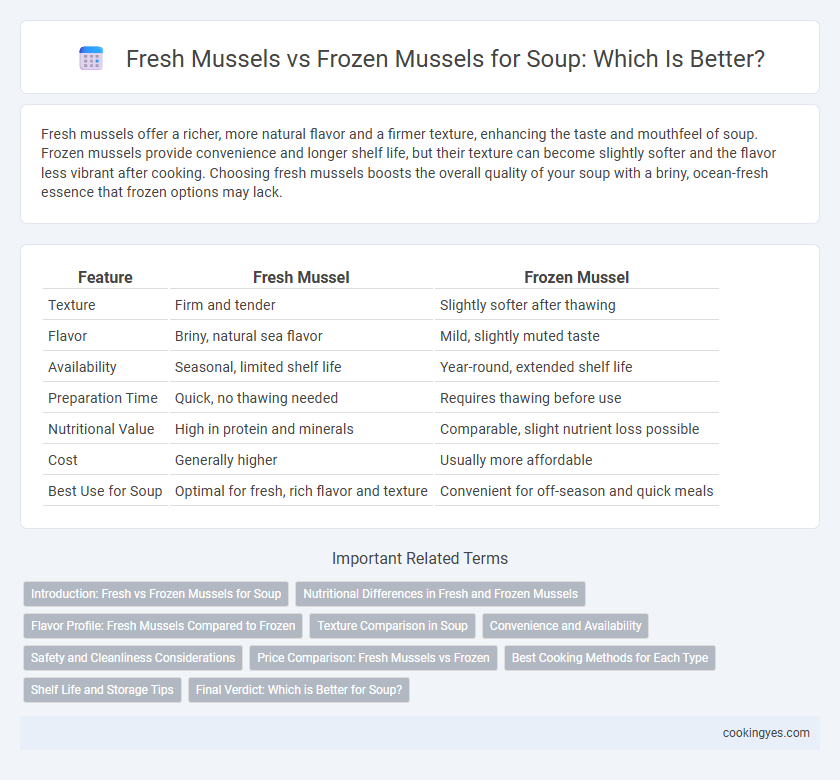Fresh mussels offer a richer, more natural flavor and a firmer texture, enhancing the taste and mouthfeel of soup. Frozen mussels provide convenience and longer shelf life, but their texture can become slightly softer and the flavor less vibrant after cooking. Choosing fresh mussels boosts the overall quality of your soup with a briny, ocean-fresh essence that frozen options may lack.
Table of Comparison
| Feature | Fresh Mussel | Frozen Mussel |
|---|---|---|
| Texture | Firm and tender | Slightly softer after thawing |
| Flavor | Briny, natural sea flavor | Mild, slightly muted taste |
| Availability | Seasonal, limited shelf life | Year-round, extended shelf life |
| Preparation Time | Quick, no thawing needed | Requires thawing before use |
| Nutritional Value | High in protein and minerals | Comparable, slight nutrient loss possible |
| Cost | Generally higher | Usually more affordable |
| Best Use for Soup | Optimal for fresh, rich flavor and texture | Convenient for off-season and quick meals |
Introduction: Fresh vs Frozen Mussels for Soup
Fresh mussels offer a vibrant, briny flavor and a tender texture essential for a gourmet soup experience, while frozen mussels provide convenience and year-round availability with slightly firmer meat. Nutrient retention in frozen mussels remains high due to quick-freezing methods, though some aroma and subtle taste nuances may be diminished compared to fresh counterparts. Selecting between fresh and frozen mussels depends on factors like seasonal availability, storage capabilities, and desired soup flavor profiles.
Nutritional Differences in Fresh and Frozen Mussels
Fresh mussels retain higher levels of vitamin C and essential minerals such as zinc and iron compared to frozen varieties, which may experience slight nutrient degradation during freezing and thawing processes. Frozen mussels, however, maintain comparable protein content and omega-3 fatty acids critical for heart health, ensuring substantial nutritional value for soup preparation. Differences in texture and flavor between fresh and frozen mussels minimally impact their overall nutritional benefits in culinary uses.
Flavor Profile: Fresh Mussels Compared to Frozen
Fresh mussels offer a briny, slightly sweet flavor with a tender texture that enhances the complexity of seafood soups. In contrast, frozen mussels often lose some of their natural juiciness and subtly delicate taste due to the freezing process, which can result in a milder, less vibrant flavor profile. Choosing fresh mussels for soup ensures a richer, more authentic seafood experience, maximizing aroma and depth in the broth.
Texture Comparison in Soup
Fresh mussels provide a tender, slightly chewy texture that enhances the mouthfeel of soup, maintaining a natural brininess and firm bite after cooking. Frozen mussels often lose some of their firmness due to the freezing process, resulting in a softer, sometimes mushier texture that can blend more uniformly into the soup. Choosing fresh mussels preserves a distinct, resilient texture, while frozen mussels contribute a smoother consistency to the broth.
Convenience and Availability
Fresh mussels offer superior flavor and texture for soup but require immediate use and careful storage to maintain freshness, limiting their availability in some regions. Frozen mussels provide year-round convenience and longer shelf life, allowing easy storage and quick preparation without compromising much on taste. Both options ensure mussel soup can be enjoyed conveniently, with frozen mussels being more accessible in off-seasons or remote areas.
Safety and Cleanliness Considerations
Fresh mussels for soup offer superior safety and cleanliness due to their intact shells and shorter storage time, minimizing the risk of bacterial contamination. Frozen mussels undergo flash freezing that halts bacterial growth and preserves freshness, but improper handling before freezing can introduce contaminants. Ensuring proper storage temperature and thorough cleaning are essential for both fresh and frozen mussels to maintain food safety standards.
Price Comparison: Fresh Mussels vs Frozen
Fresh mussels typically command a higher price due to their short shelf life and the costs associated with local sourcing and immediate transportation. Frozen mussels offer a more budget-friendly option, benefiting from extended storage and reduced spoilage costs, making them ideal for soups requiring longer cooking times. Price variations also depend on regional availability, with fresh mussels often costing 20% to 40% more than frozen counterparts.
Best Cooking Methods for Each Type
Fresh mussels for soup deliver a briny, tender texture best achieved by steaming or simmering gently to preserve their natural flavor and prevent toughness. Frozen mussels, often pre-cooked and vacuum-sealed, require brief reheating or incorporation into hot soups to maintain succulence without overcooking. For optimal results, fresh mussels benefit from slow, low-heat cooking, while frozen mussels excel in rapid warming methods that retain moisture.
Shelf Life and Storage Tips
Fresh mussels typically have a shelf life of 1 to 2 days when stored in the refrigerator at 35-40degF, making them ideal for immediate use in soups to ensure optimal flavor and texture. Frozen mussels can last up to 3 months in the freezer at 0degF or below, providing a convenient option for long-term storage without significant loss of quality. To maximize freshness, keep fresh mussels in a breathable container covered with a damp cloth, and thaw frozen mussels gradually in the refrigerator before adding them to soup recipes.
Final Verdict: Which is Better for Soup?
Fresh mussels offer a naturally briny flavor and firm texture that enhances the depth and authenticity of soup dishes, making them the preferred choice for culinary enthusiasts. Frozen mussels, while convenient and accessible year-round, may lose some of their fresh taste and develop a softer texture after thawing, potentially affecting the soup's overall quality. For optimal flavor and texture in mussel soups, fresh mussels are generally considered superior.
Fresh mussel vs Frozen mussel for soup Infographic

 cookingyes.com
cookingyes.com